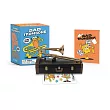Freeman is best known today for her short regionalist fiction. Recently, Freeman studies have taken new turns including ecocriticism, trauma studies, the Gothic, and queer theory. The essay collection pushes these developments further. Contributors aim at revisiting and going beyond Freeman’s regionalism. They challenge earlier feminist readings of the female realm by arguing that her short fiction and novels depict women and girls as violent and criminal, suffocating as well as nurturing; they bring to light questions of race and ethnicity that have been conspicuously absent from scholarship on Freeman, as well as issues of class. Because questions of women’s work are central to Freeman’s oeuvre, this collection discusses Freeman’s acumen as a businesswoman herself, a participant as well as a castigator of turn-of-the-century US capitalism. Finally, essays reconsider the periodization of Freeman by exploring her little acknowledged post-1902 and therefore post-marriage fiction--her war stories and her urban stories.



 天天爆殺
天天爆殺  今日66折
今日66折 

























 博客來
博客來 博客來
博客來 博客來
博客來 博客來
博客來 博客來
博客來